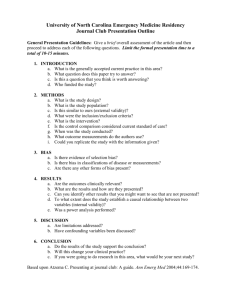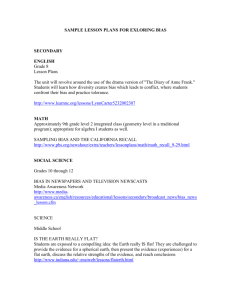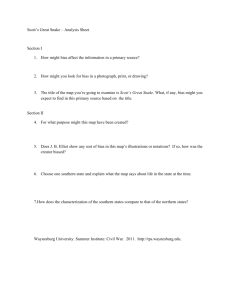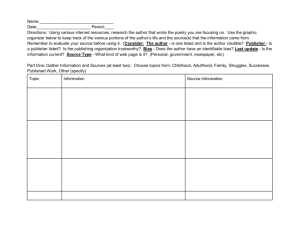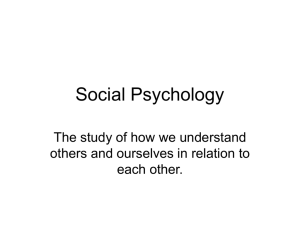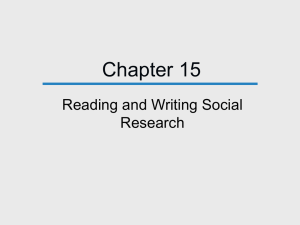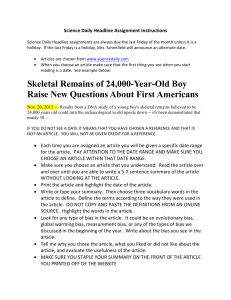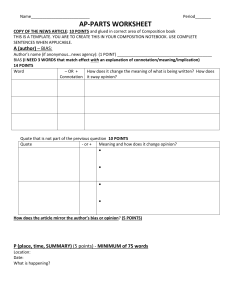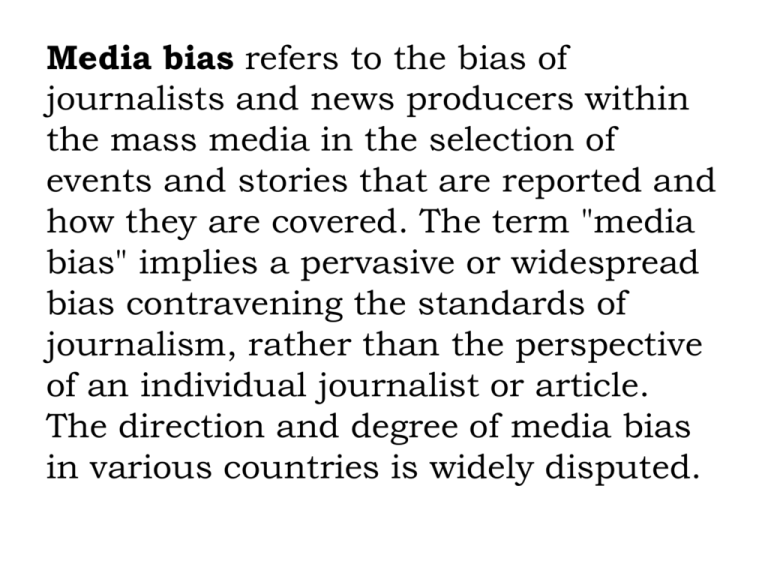
Media bias refers to the bias of
journalists and news producers within
the mass media in the selection of
events and stories that are reported and
how they are covered. The term "media
bias" implies a pervasive or widespread
bias contravening the standards of
journalism, rather than the perspective
of an individual journalist or article.
The direction and degree of media bias
in various countries is widely disputed.
Types of Bias
The most commonly discussed forms of bias occur when the media
support or attack a particular political party, candidate, or ideology,
but other common forms of bias include:
Advertising bias, when stories are selected or slanted to please
advertisers.
Corporate bias, when stories are selected or slanted to please
corporate owners of media.
Mainstream bias, a tendency to report what everyone else is reporting,
and to avoid stories that will offend anyone.
Sensationalism, bias in favor of the exceptional over the ordinary,
giving the impression that rare events, such as airplane crashes, are
more common than common events, such as automobile crashes.
Other forms of bias including reporting that favors or attacks a
particular race, religion, gender, age, sexual orientation, or ethnic
group.
There are many examples of accusations of bias being used
as a political tool, sometimes resulting in government
censorship.
In 1798, Congress passed the Alien and Sedition Acts, which prohibited
newspapers from publishing “false, scandalous, or malicious writing”
against the government, including any public opposition to any law or
presidential act. This act was in effect until 1801.
During the American Civil War, President Lincoln accused newspapers
in the border states of bias in favor of the Southern cause, and ordered
many newspapers closed.
Film and television media were accused of bias in favor of mixing of the
races, and many television programs with racially mixed casts, such as
I Spy and Star Trek, were not aired on Southern stations.
During the war between the United States and North Vietnam, Vice
President Spiro Agnew accused newspapers of anti-American bias, and
in a famous speech delivered in San Diego in 1970, called anti-war
protesters "the nattering nabobs of negativism."
Language may be a more subtle form of bias.
Use of a word with positive or negative
connotations rather than a more neutral
synonym can form a biased picture in the
audience's mind. It makes a difference whether
the media calls a group "terrorist" or "freedom
fighters" or "insurgents".
For example, a 2005 memo to the staff of the CBC
states: Rather than calling assailants "terrorists,"
we can refer to them as bombers, hijackers,
gunmen (if we're sure no women were in the
group), militants, extremists, attackers or some
other appropriate noun.
Who are the sources?
Be aware of the political perspective of the sources used in a
story. Media over-rely on "official" (government, corporate and
establishment think tank) sources. For instance, FAIR found
that in forty months of Nightline programming, the most
frequent guests were Henry Kissinger, Alexander Haig, Elliott
Abrams and Jerry Falwell. Progressive and public interest voices
were grossly underrepresented.
To portray issues fairly and accurately, media must broaden
their spectrum of sources. Otherwise, they serve merely as
megaphones for those in power.
Count the number of corporate and government sources
versus the number of progressive, public interest, female
and minority voices. Demand mass media expand their
rolodexes; better yet, give them lists of progressive and
public interest experts in the community.
Are unchallenged assumptions left to stick?
Often the most important message of a story is not
explicitly stated. For instance, in coverage of women on
welfare, the age at which a woman had her first child will
often be reported—the implication being that the woman's
sexual "promiscuity," rather than institutional economic
factors, are responsible for her plight.
Coverage of rape trials will often focus on a woman's
sexual history as though it calls her credibility into
question. After the arrest of William Kennedy Smith, a
New York Times article (4/17/91) dredged up a host of
irrelevant personal details about his accuser, including
the facts that she had skipped classes in the 9th grade,
had received several speeding tickets and-when on a datehad talked to other men.
Political Correctness
A term which denotes language, ideas, policies, and
behavior seen as seeking to minimize social and
institutional offense in occupational, gender, racial,
cultural, sexual orientation, certain other religions,
beliefs or ideologies, disability, and age-related
contexts, and, as purported by the term, doing so to an
excessive extent. In current usage, the term is primarily
pejorative.
The term politically incorrect connotes language, ideas,
and behavior unconstrained by a perceived orthodoxy
or by concerns about offending or expressing bias
regarding various groups of people.
Other forms of media bias are based
on the various kinds of relationships
between the dominant forces in
modern media. Included
relationships:
•
•
•
•
•
•
•
•
•
Corporate Ownership
Advertiser Influence
Official Agendas
Telecommunications Policy
The PR Industry
Pressure Groups
The Narrow Range of Debate
Censorship
Sensationalism
Sensationalism
When dozens of women were sexually assaulted
in and around Central Park on June 11, 2000
the story became front page news locally and
nationally.
While many outlets focused on allegations that
police officers did little to prevent the attacks or
help the victims, a disturbing trend emerged in
coverage of the story. In a media climate
accustomed to sensationalized images of mass
crime scenes, news outlets seemed to use the
Central Park "wilding" story as an excuse to
feature lurid amateur video footage of the
assaults.
Outlets from the Fox News Channel to the New
York Post repeatedly featured images of nearly
naked women crying, screaming or trying
desperately to cover themselves as they were
forcibly stripped and molested.
Sexual assault on this scale-- and the police
force's failure to respond to it-- is certainly news.
But media did not have to run tape of inprogress sexual assaults to tell the story. Victims
caught on tape attempting to cover themselves
didn't want bystanders in the park to see them
naked; by running this footage over and over,
news outlets made sure that the victims were
exposed to anyone tuning into the TV news for
weeks to come. In doing so, news outlets have
further humiliated the victims, exposing them on
a grander scale than did the original attackers.
Do words cause offense or is it the speaker
Many in the media were troubled when one spoke,
but an eyebrow was barely raised when the other uttered the same words.
Media Bias
Student will watch
the Media Bias
Video from the
Newseum
Students are to take
notes on the video.
Subsequent Videos
Students are asked
to respond by
identifying the bias
in the piece.
Media Bias Videos Two
A Moment of Media Sanity –
From Russian Television
Media Bias Videos Three
Bernard Goldberg and
Media Bias
4 Media Bias Number Four
Irony and Media Bias
Media Bias
Al Jazerra
Where is the Media Bias in this
piece reported from the Middle
East?
During a London concert ten days
before the 2003 invasion of Iraq,
lead vocalist of the Dixie Chicks
Natalie Maines said, "we don't
want this war, this violence, and
we're ashamed that the President
of the United States (George W.
Bush) is from Texas".
The statement offended many
Americans, who thought it rude
and unpatriotic, and the ensuing
controversy cost the band half of
their concert audience
attendance in the United States.
The incident negatively affected
their career and led to
accusations of the three women
being "un-American", as well as
hate mail, death threats, and the
public destruction of their
albums in protest.
Telecommunications
Policy
The United States' original
communications policy is the 1st
Amendment. Freedom of the press
was guaranteed in the Constitution
because an exchange of information
and an unfettered debate were
considered essential components of
a democratic society.
Today, however, government policy
is designed less to facilitate a
democratic discussion than to
protect the investments of media
corporations. Regulations tend to
promote the formation of huge
media conglomerates and
discourage new, competing voices.
Pressure
Groups
While institutional pressures are
enough to keep most journalists from
straying from the conventional
wisdom, pressure groups stand ready
to punish reporters who challenges
the official agenda.
While grassroots activism around
media issues is legitimate and indeed
essential, when does an activist group
become a pressure group? A pressure
group is more concerned with
suppressing viewpoints that it
disagrees with than ensuring that a
wide range of perspectives is available.
Pressure groups are often funded by
companies or industries whose
interests they promote, these groups
often push ideologies that are already
well-represented in media debates.
Advertiser Influence
An internal memo from ABC Radio Networks to its
affiliates reveals scores of powerful sponsors have a
standing order that their commercials never be placed
on syndicated Air America programming . The memo
gives the following order to affiliates:
Please be advised that Hewlett Packard has
purchased schedules with ABC Radio Networks
between October 30th and December 24th, 2006.
Please make sure you blackout this advertiser on
your station, as they do not wish it to air on any
Air America affiliate.
The directive advises ABC Radio Network affiliates to
take note of a list of other sponsors who do not want
their programming to run during Air America
programming.
The list, totaling 90 advertisers, includes some of
largest and most well-known corporations advertising
in the U.S.: Wal-Mart, GE, Exxon Mobil, Microsoft,
Bank of America, Fed-Ex, Visa, Allstate,
McDonald's, Sony and Johnson & Johnson. The
U.S. Postal Service and the U.S. Navy are listed as
advertisers who don't want their commercials to air on
Air America.
When Al Gore proposed launching a progressive TV
network, in 2003, a Fox News executive told
Advertising Age: "The problem with being associated as
liberal is that they wouldn't be going in a direction that
advertisers are really interested in.... If you go out and
say that you are a liberal network, you are cutting your
potential audience, and certainly your potential
advertising pool, right off the bat."
Most of the income of for-profit media
outlets comes not from their audiences, but
from commercial advertisers who are
interested in selling products to that
audience. Although people sometimes
defend commercial media by arguing that
the market gives people what they want, the
fact is that the most important transaction
in the media marketplace-- media
companies selling audiences to sponsors.
This gives corporate sponsors a
disproportionate influence over what people
get to see or read. Most obviously, they
don't want to support media that regularly
criticizes their products or discusses
corporate wrongdoing. More generally, they
would rather support media that puts
audiences in a passive, non-critical state of
mind-making them easier to sell things to.

